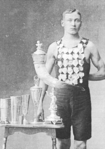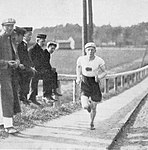1908 Summer Olympics / Athletics - Marathon (Men)

|
|
| sport | athletics |
| discipline | Marathon run |
| gender | Men |
| place | Windsor Castle - White City Stadium |
| Attendees | 56 athletes from 16 countries |
| Competition phase | July 24, 1908 |
| Medalist | |
|---|---|
|
|
John Hayes ( USA )
|
|
|
Charles Hefferon ( RSA )
|
|
|
Joseph Forshaw ( USA )
|
The men's marathon at the 1908 London Olympics was decided on July 24, 1908 at White City Stadium .
A distance of 25 miles was first measured from the White City Stadium. This only reached as far as the Barnespool Bridge in Eton . But since Windsor Castle had already been set as the starting point, the distance had to be lengthened by exactly one mile. If the length of the track had been retained, the race would have ended at the stadium entrance. So 385 yards had to be added to the finish in front of the royal box . This resulted in 42.195 km. As more and more marathon events took over the London route length in the following years, the IAAF decided in May 1921 to officially set this down in the rules.
Under dramatic circumstances, which are described in more detail below, the American John Hayes became Olympic champion. The South African Charles Hefferon won the silver medal. Bronze went to the American Joseph Forshaw .
Records
Because the distances for marathons were not standardized at the time, records and top performances are to be seen with reservations. The unofficial world record was set in a race over 39 km, the Olympic record - depending on the reading - over 41.86 or 42 km. With the Olympic record the question arises whether the result of the Athens Interim Games of 1906 is included or whether only the results of the regular Olympic Games, which take place every four years, count. Both variants are shown in the following list.
| World record | Distance 39 km | 2: 24: 24.0 h |
|
Tom Longboat | 1907 |
| Olympic record - counting with interludes | Distance 41.86 km | 2: 51: 23.6 h |
|
Billy Sherring | Athens Marathon ( Greece ), May 1, 1906 |
| Olympic record - counting without interludes | Distance 42 km | 2:58:50 h |
|
Spyridon Louis | Athens Marathon ( Greece ) April 10, 1896 |
The winning time in London is held as an Olympic record, as the route initially had the usual length of 42.195 kilometers and was thus longer than in all previous events including the interludes of 1906.
| OR | 2: 55: 18.4 |
|
John Hayes |
Results
The run took place in sunshine and high temperatures. After the fifth mile led a group of six with four British, the Italian Dorando Pietri and the South African Charles Hefferon. But this group started the race too quickly and was gradually falling apart. At the front, Hefferon continuously expanded his lead and was 3:52 minutes ahead of Pietri after 20 miles (32.2 km). But Pietri suddenly accelerated, which leads to the suspicion that he was doped with strychnine sulfate. Hefferon collapsed unexpectedly after 22 miles (35.4 km), was overtaken by Pietri at mile 25 and a little later by John Hayes. Pietri arrived at the fully occupied White City Stadium with a big lead, only half a round of the stadium separated him from a certain Olympic victory. But he had exhausted himself completely, was dazed and initially turned in the wrong direction. When the referees showed him the right way to the goal, Pietri collapsed completely exhausted. He was able to get up again, but fell three more times in the last 350 meters. Ten meters from the finish he collapsed for the fifth time, whereupon he was pushed across the finish line by some sympathetic doctors and judges. 32 seconds after Pietri, Hayes also crossed the finish line.
Pietri had to be disqualified because of the unauthorized assistance, but received a gold cup from Queen Alexandra the following day for his performance. Olympic champion Hayes, who had received far less attention, was seated on a table by his American team-mates and carried around the stadium cheerfully.
The Sherlock Holmes author Arthur Conan Doyle wrote for the newspaper Daily Mail to announce a detailed and emotional account of this event, who did much the story of Dorando Pietri. At the same time, Doyle called for donations for the Italian. Doyle's dedication is likely the reason for the popular legend that he himself helped Pietri cross the finish line.
The Canadian George Goulding - much more successful as a walker, Olympic champion in London, even Olympic champion in 1912 - came in 22nd in the marathon
literature
- Volker Kluge , Olympic Summer Games - The Chronicle I, Berlin 1997 ( ISBN 3-328-00715-6 )
- Ekkehard zur Megede , The history of Olympic athletics, Volume 1: 1896–1936, Verlag Bartels & Wernitz KG, Berlin, 2nd edition 1970
Video
- Controversial Finish to the 1908 Olympic Marathon , on youtube.com, accessed August 27, 2018
Web links
- Sports-Reference, Athletics at the 1908 London Summer Games: Men's 100 Marathon , accessed August 27, 2018
- Olympic Games London 1908, Athletics, marathon men , IOC page on athletics at the 1908 Olympic Games at olympic.org, English, accessed on 27 August 2018










